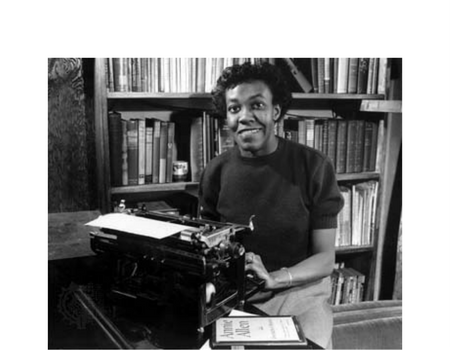Medgar Evers College, 1650 Bedford Avenue, this week held a symposium on the powerful and unmatched works of poet Gwendolyn Brooks (1917-2000).
Although born in Topeka, Kansas, Brooks moved with her parents to Chicago when she was six weeks old and she spent her entire life there.

The occasion had punch, intelligence and focus as it paid tribute to the 1950 Pulitzer Prize winner for poetry. To commemorate the 100th anniversary of her birth, school president Rudy Crew described Ms. Brooks as a poet who “wrote about ordinary things; she wrote about ordinary people, most of them she knew through her everyday walk of life.”
The symposium titled “Our Miss Brooks,” which was open free to visitors, featured a handful of poets who gathered to read Ms. Brooks’s work, tell stories and listen to an African musical interlude.
The event, organized by the Center for Black Literature at Medgar Evers College, was part of the 2017 National Black Writers Conference Biennial Symposium.
Keynote speaker Dr. Haki R. Madhubuti, who had worked with Ms. Brooks, said, “she was a mentor to me and literally thousands of other writers and poets. She will live for us at all times. Her writing was also a good indication of the conditions that essentially occupy our lives now, as Black Lives Matter tells us.”
Ms. Brooks was the first African-American winner of a Pulitzer Prize. She authored 25 books of poetry, a novel and children’s books.
The full list of poets and the poems they read included: Jennifer Williams, “To Bronzeville with Love”, Eve Dunbar, “Loving Gorillas: Reimagining Possibilities—Human/Non-human interactions in Maud Martha”, Lillian Bertram, “It’s Not a Coincidence: The Aeneid and Gwendolyn Brooks’ The Anniad”, while Poets Soré Abaje, Marilyn Nelson, Nicole Sealey, and Rebecca Plunkett and Shirley V.H. Cooper read a selection of readings from the works of Ms. Brooks.
Through it all, it was a big day for poets, that was the consensus among the 250 or so folks who attended the tribute. Ms. Brooks was known around the world as one of the most highly regarded and influential figures in American poetry.
Her poem “Jane Addams” commemorating the 100th anniversary of the Hull House in Chicago, and one of America’s first centers for social reform, leaves us with this ethereal harmony for our own current era of uncharted waters where there’s so much negative energy involved with manipulating the body politic:
I am Jane Addams.
I am saying to the giantless time —
to the young and yammering, to the old and corrected,
well, chiefly to Children Coming Home
with worried faces and questions about world-survival –
“Go ahead and live your life.
You might be surprised. The world might continue.”
It was not easy for me, in the days of the giants,
And now they call me a giant.
Because my capitals were Labour, Reform, Welfare,
Tenement Regulation, Juvenile Court Law (the first),
Factory Inspection, Workmen’s Compensation,
Woman Suffrage, Pacifism, Immigrant Justice.
And because
Black, brown and white and red and yellow
heavied my hand and heart.
I shall tell you a thing about giants
that you do not wish to know.
Giants look in mirrors and see
almost nothing at all.
But they leave their houses nevertheless.
They lurch out of doors
to reach you, the other stretchers and strainers.
Erased under ermine or loud in tatters, oh
moneyed or mashed, you
matter.
You matter. And giants
must bother.
I bothered.
Whatever I was tells you
the world might continue. Go on with your preparations,
moving among the quick and the dead;
nourishing here, there;
pressing a hand
among the ruins,
and among the seeds of restoration.
So speaks a giant. Jane.






